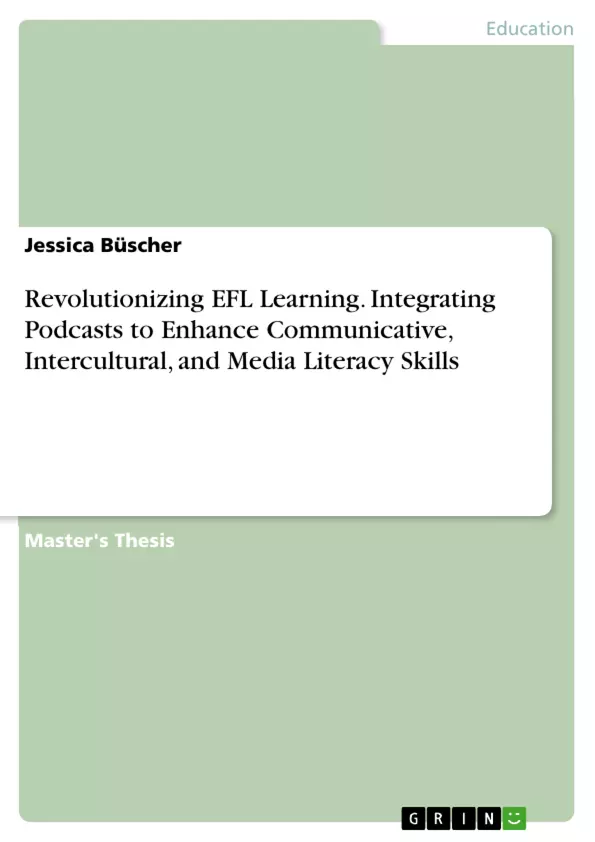This paper explores how podcasts can revolutionize learning in the EFL (English as a foreign language) classroom. Not only are podcasts easily accessible and transcend knowledge barriers, but they also foster close-knit communities and offer a variety of genres and formats. Although increasingly popular with young adults, their potential often remains untapped in schools.
This study aims to show how teachers can use podcasts effectively in the classroom to promote communicative, intercultural and media literacy skills. With concrete application examples and creative teaching concepts, we want to give teachers the tools to integrate podcasts profitably into EFL lessons and thus make learning more exciting and interactive.
Inhaltsverzeichnis (Table of Contents)
- Introduction
- Background and Motivation
- Research Question
- Outline
- Theoretical Background
- Podcasts
- Definition of Podcasts
- History of the Podcast
- Different Types and Genres of Podcasts
- Competencies in Teaching English as a Foreign Language
- Communicative Competencies
- Intercultural Competencies
- Media Competencies
- Didactic Considerations: Podcasts in the EFL Classroom
- Podcasts as Language Learning Materials
- Justification by the Curricula
- Podcasts
- Empirical Background
- Research Question
- Methodology
- Research Design
- Method of Data Collection
- Method of Data Analysis
- Results
- Technology Application
- Podcast Experience
- Podcast Advantages
- Competence Promotion
- Podcast Disadvantages
- Educational Application
- Podcast Material
- Suitable Podcast Topics
- Differentiation Using Podcasts
- Outcome Maximization
- Discussion
- Conclusion and Outlook
Zielsetzung und Themenschwerpunkte (Objectives and Key Themes)
This master's thesis investigates the use of podcasts in the EFL classroom, exploring the potential benefits and challenges of integrating this medium into language teaching. The study aims to provide a comprehensive understanding of podcasts as a valuable resource for language learning and to contribute to the existing research on the effectiveness of podcast use in education.
- The potential of podcasts as a valuable language learning tool.
- The diverse types and genres of podcasts available for educational purposes.
- The role of podcasts in promoting communicative, intercultural, and media competencies in EFL learners.
- The challenges and opportunities associated with integrating podcasts into EFL teaching practices.
- The effectiveness of podcast use in promoting language acquisition and overall learning outcomes.
Zusammenfassung der Kapitel (Chapter Summaries)
- Introduction: This chapter provides a background and motivation for the study, outlining the growing popularity and influence of podcasts. It highlights the potential of podcasts for fostering connection and community, bridging knowledge barriers, and promoting language learning.
- Theoretical Background: This chapter delves into the theoretical foundations of the study. It defines podcasts, discusses their history and different types, and explores the key competencies in teaching English as a Foreign Language (EFL), including communicative, intercultural, and media competencies. It then focuses on didactic considerations related to using podcasts in the EFL classroom, including their potential as language learning materials and their alignment with curricula.
- Empirical Background: This chapter explores the existing research on podcast use in education, providing a foundation for the study's empirical investigation.
- Research Question: This chapter presents the study's central research question, outlining the specific area of investigation.
- Methodology: This chapter details the research design, data collection methods, and data analysis techniques employed in the study.
- Results: This chapter presents the findings of the study, exploring the use of technology, podcast experiences, advantages and disadvantages, competence promotion, educational applications, and the suitability of podcast topics for different language learning purposes.
- Discussion: This chapter analyzes and interprets the findings of the study, discussing the implications of the results for EFL teaching practices.
Schlüsselwörter (Keywords)
The primary keywords and focus topics of this study include: podcasts, English as a Foreign Language (EFL), language learning, communicative competence, intercultural competence, media competence, didactic considerations, educational applications, and research findings. This master's thesis aims to shed light on the evolving landscape of language learning and to explore the potential of podcasts as a valuable tool for EFL educators.
- Quote paper
- Jessica Büscher (Author), 2022, Revolutionizing EFL Learning. Integrating Podcasts to Enhance Communicative, Intercultural, and Media Literacy Skills, Munich, GRIN Verlag, https://www.grin.com/document/1491807



